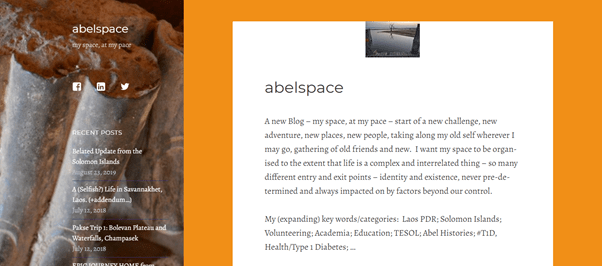I’ve decided that I’ve been around long enough to be able to say … stop trying to make me feel like a failure, in not being able to ‘keep up’. I do a damned good job at my work which is to educate, to engage, to facilitate students to think beyond and outside what they know already. To challenge themselves and each other. To challenge me, and what I know, because I’m not here in my role to ‘make you think like me’…
At this moment, I am tired of finding myself not being able to follow something because of the language being used to talk about things I actually do know about, of feeling like a twit because when someone jumps around on a keyboard to show me something I can’t follow – even though I know my own keyboard and speed of responding perfectly well, and it works for what I need to do with it. That I have used and developed my skills with utilising multiple platforms to run damned engaging learning experiences (aka seminars) for my students – including Powerpoint (oh no!!!!) in conjunction with Zoom, breakout rooms, small and large discussions, shared documents that can be a shared record of 6 different conversations being had at the same time, and kept as a record of that moment and looked back upon to reflect on how learning and knowledge might have progressed since then, or to remember issues raised by peers that you hadn’t thought of before yourself.
I’m not being ‘academic’ here, I’m afraid I can’t give you a list of references to support my ranting. Probably due to the same reasons why, at my age and stage of life, I don’t care about publishing in A grade journals or being cited numerous times because I have been so clever at commercialising myself as a brand, and improving my (what are those metrics for measuring academic success???? I don’t know because I don’t care) status. Cleverly planting my name where it will be most noticed and most revered, creating my own metrics to ensure those aforementioned (not mentioned because I can’t remember what they’re called) status statuses have a wide distribution.
Today I ran 2 seminars about Aboriginal and Torres Strait Islander Education. Amongst other content, I shared this quote:
Sir Baldwin Spencer
I was informed that there is a building on the UniMelbourne campus named after the man who said this about Aboriginal people. That he would have been quoted as an ‘expert’ in his field, over an unfortunately long period of time. I’m not privy to this history, but the conversation that ensued with the group of Pre Service teachers, was exhilarating. Anger, surprise, new awareness (in terms of their role as 21st century educators), confusion, discussions of power, influence, voice…
Skipping back to the topic, this is content delivered via Powerpoint/Zoom. This was a wonderful moment in an environment of learning and discovery. This was part of a 2 hour block that I was the instigator of – controlling, revealing, timing of activities, listening to students, ensuring they had opportunities to explore these issues amongst themselves, based on pre-readings/viewing/listening. Part of my expertise is being able to respond to what is being discussed by them, knowing when to give them more time or perhaps a cue to provoke deeper considerations.
Over the last year I have got a lot better at doing this with the tools available. I’m yet to see a demonstration of any tool that would improve on this process. I am open to challenging myself and trying out new things – I attended a zoom seminar last night while lying in bed (9pm Hong Kong time, 12 midnight here!) and the facilitator made great use of quick quizzes. Really interesting questions that I answered honestly and avidly. Unfortunately she did not share the information gleaned from these quizzes back to us the participants – so it was really for her own benefit not ours. Which makes me think, again and again, for whose benefit are we using these whiz bang tools? Is it even worth the effort?










